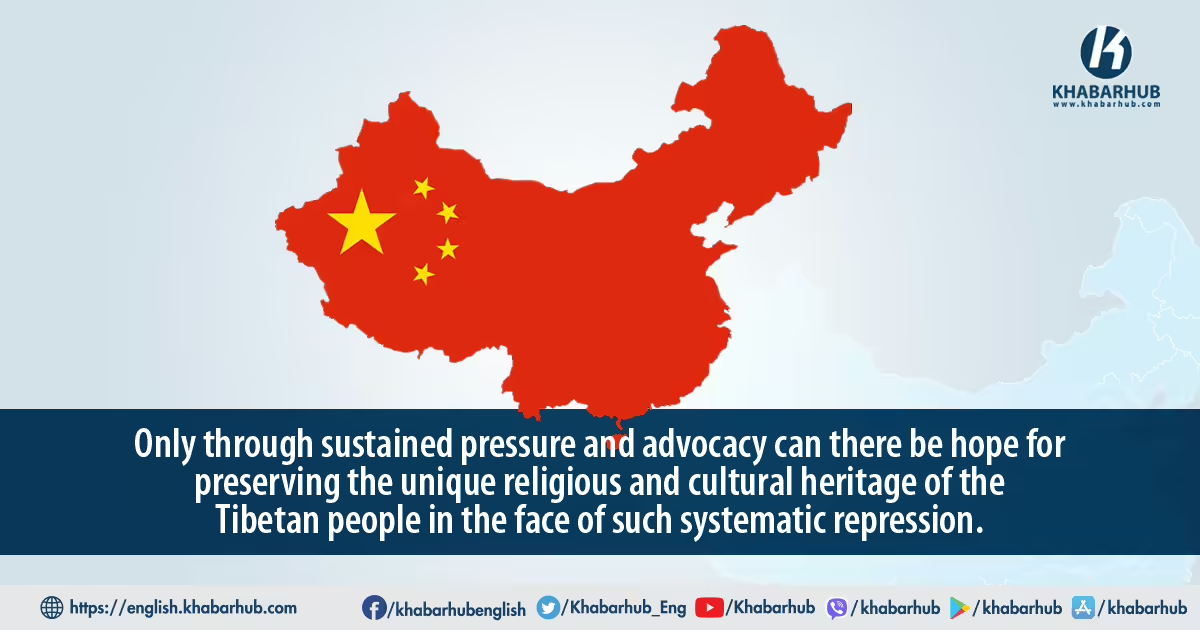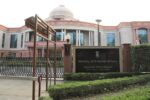The United States State Department’s 2023 Report on International Religious Freedom, released on June 26, 2024, offers a damning assessment of China’s ongoing suppression of religious freedom in Tibet.
This comprehensive review serves as a stark reminder of the Chinese Communist Party’s (CCP) relentless efforts to control and manipulate every aspect of Tibetan Buddhism, effectively strangling the spiritual and cultural life of the Tibetan people.
At the heart of China’s oppressive policy lies an insidious campaign of “Sinicization” – a euphemism for the systematic erasure of Tibetan identity and the forced assimilation of Tibetan Buddhism into a CCP-approved version of Chinese culture.
This is not merely cultural imperialism; it is a calculated strategy to neutralize what Beijing perceives as a threat to its authority and to remake Tibetan Buddhism in its own image.
The State Department report highlights the CCP’s 2019-2023 five-year plan to Sinicize Buddhism in China, with a particular focus on Tibetan Buddhism.
The requirement for monasteries to obtain official permission for large-scale religious events or gatherings further restricts the free practice of religion.
This plan, far from being a benign cultural initiative, is a blueprint for ideological control.
It demands loyalty to the CCP and the state above all else, effectively attempting to replace spiritual devotion with political allegiance.
The involvement of the state-run Buddhist Association of China (BAC) in this process only underscores the extent to which the Chinese government is willing to co-opt religious institutions to serve its political agenda.
Perhaps most alarming is the CCP’s brazen interference in the most sacred aspects of Tibetan Buddhist tradition.
The report details how the United Front Work Department (UFWD), an arm of the CCP, has arrogated to itself the power to control the selection of Tibetan religious leaders, including the recognition of reincarnated lamas.
This is not merely administrative overreach; it is a fundamental violation of religious freedom and an attempt to control the very spiritual lineage of Tibetan Buddhism.
The regulations stipulating that reincarnate lamas must be born within China and that no foreign organization or individual may interfere in their selection are particularly egregious.
These rules are transparently designed to prevent the current Dalai Lama, who lives in exile, from having any say in the recognition of his successor.
It is a calculated move to sever the spiritual connection between Tibetans inside Tibet and their exiled religious leader, and to ensure that future religious leaders are compliant with CCP dictates.
The ongoing disappearance of Gedhun Choekyi Nyima, recognized as the 11th Panchen Lama by the Dalai Lama and most Tibetan Buddhists, stands as a chilling testament to the lengths the Chinese government will go to control Tibetan Buddhism.
Abducted at the age of six in 1995, his whereabouts remain unknown nearly three decades later.
This act of state-sponsored kidnapping not only violates basic human rights but also represents a direct assault on the religious traditions of Tibetan Buddhism.
The report also sheds light on the Chinese government’s efforts to erase the Tibetan language and culture.
Monasteries are being forced to translate texts from Tibetan to Mandarin, a move that observers rightly identify as an attempt to undermine the Tibetan language.
The forced replacement of images of the Dalai Lama and other revered lamas with portraits of CCP leaders in both monasteries and private homes is a particularly cruel form of cultural violence, striking at the heart of Tibetan spiritual practice.
The ban on images of the Dalai Lama, with harsh repercussions for those who dare to own or display them, is a clear violation of religious freedom and personal expression.
It speaks volumes about the CCP’s fear of the Dalai Lama’s influence and its determination to eradicate any trace of loyalty to him among the Tibetan people.
The report also highlights the intensification of repression around politically sensitive events, religious anniversaries, and cultural events with religious components.
The cancellation or curtailment of lay attendance at religious events, even those that had received official approval, demonstrates the capricious nature of CCP control and the constant state of uncertainty under which Tibetan Buddhists must practice their faith.
The role of the United Front Work Department in managing religious affairs through the State Administration of Religious Affairs (SARA) reveals the extent to which religion in Tibet is viewed as a political matter rather than a spiritual one.
The systematic attempt to control, manipulate, and ultimately reshape Tibetan Buddhism to serve the political interests of the CCP is nothing short of cultural genocide.
The UFWD’s claim to have the right to deny recognition of reincarnations of high lamas of “especially great influence” is a clear indication of the CCP’s fear of charismatic religious leaders who might challenge its authority.
The regulations that allow citizens to take part only in officially approved religious practices are a direct assault on religious freedom. By asserting CCP control over all aspects of religious activity, including the management of religious venues, groups, personnel, and schools, the Chinese government is effectively trying to remake Tibetan Buddhism into a state-controlled entity devoid of its spiritual essence.
This comprehensive control extends to the minutiae of daily religious life. The CCP maintains a registry of officially recognized reincarnate lamas, effectively bureaucratizing a deeply spiritual process. Local governments in Tibetan areas are given control over the registration of monasteries, nunneries, and other Buddhist religious centers, subjecting these sacred spaces to constant scrutiny and potential interference.
The requirement for monasteries to obtain official permission for large-scale religious events or gatherings further restricts the free practice of religion.
This micromanagement of religious activities not only stifles spontaneous expressions of faith but also allows the CCP to monitor and control the gathering of Tibetan Buddhists, likely out of fear that such assemblies could foster dissent or opposition to Chinese rule.
The International Campaign for Tibet’s president, Tencho Gyatso, rightly points out that the suppression of religious freedom in Tibet, including the efforts to control the succession of the Dalai Lama, are core issues for the survival of Tibetan civilization and its future.
The spotlight put on Tibet in this year’s State Department religious freedom report is indeed needed more than ever.
As the world watches, China’s policies in Tibet continue to flagrantly violate international norms of religious freedom and human rights.
Only through sustained pressure and advocacy can there be hope for preserving the unique religious and cultural heritage of the Tibetan people in the face of such systematic repression.
The systematic attempt to control, manipulate, and ultimately reshape Tibetan Buddhism to serve the political interests of the CCP is nothing short of cultural genocide.
It is a campaign that strikes at the very heart of Tibetan identity and spirituality. China’s policies in Tibet are not just a matter of domestic concern; they represent a challenge to the universal principles of religious freedom and human rights.
The CCP’s actions in Tibet reveal a government deeply insecure about its legitimacy, resorting to heavy-handed tactics to suppress a peaceful religious tradition that it views as a threat to its power.
The Sinicization of Tibetan Buddhism is not merely a policy of cultural assimilation; it is an attempt to fundamentally alter the nature of Tibetan spiritual practice to serve the state’s interests.
By insisting that Tibetan Buddhism “follow the path of socialism with Chinese characteristics” and “correctly handle the relationship between national law and canon,” the CCP is effectively demanding that religious doctrine be subordinated to party ideology.
This approach not only violates the basic tenets of religious freedom but also demonstrates a profound misunderstanding of the nature of spiritual belief.
Religion, particularly one as deeply rooted in tradition and philosophy as Tibetan Buddhism, cannot simply be rewritten to suit political objectives without losing its essential character and meaning.
As long as Tibet remains under the iron grip of CCP control, with every aspect of religious life subject to state scrutiny and manipulation, the rich spiritual traditions of Tibetan Buddhism – and indeed, the very survival of Tibetan culture – remain in grave peril.
The international community must continue to shine a light on these abuses and hold China accountable for its actions in Tibet.
Only through sustained pressure and advocacy can there be hope for preserving the unique religious and cultural heritage of the Tibetan people in the face of such systematic repression.









Comment